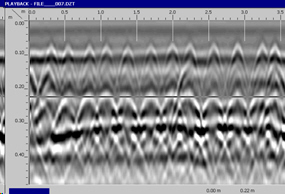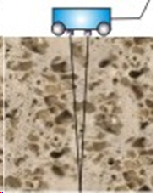Need to know your concrete slab thickness?
Concrete Diagnostics can use a range of Non Destructive Testing (NDT) methods to determine the concrete slab thickness.
They are dependent on your requirements and how thick the concrete may be.
Ideally we would use two Non Destructive Testing (NDT) methods such as Ground Penetrating Radar (GPR) and Magnetic field detection (same principles as our exit point location service) if we can gain access to the underside of the concrete slab.
Another Non-Destructive Testing (NDT) method Concrete Diagnostics could use, if required, is called impact echo, this technique is used if there is too much steel in the concrete, the concrete is thick, or there is no access to the underside of the slab (eg a ground slab).
As with any Non Destructive Testing (NDT) method it is always recommended to verify with a small pilot hole if possible.







